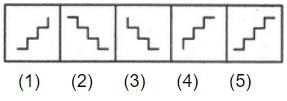Analogy: Solved Examples | General Aptitude for GATE - Mechanical Engineering PDF Download
Directions to Solve
Each of the following questions consists of two sets of figures. Figures A, B, C and D constitute the Problem Set while figures 1, 2, 3, 4 and 5 constitute the Answer Set. There is a definite relationship between figures A and B. Establish a similar relationship between figures C and D by selecting a suitable figure from the Answer Set that would replace the question mark (?) in fig. (D).

Question 1)
Select a suitable figure from the Answer Figures that would replace the question mark (?).
Problem Figures: 
Answer Figure
A. 1
B. 2
C. 3
D. 4
E. 5
Answer: Option C
Solution:
The half-shaded leaf rotates 135ºAnti Clock Wise and the un-shaded leaf rotates 135ºClock Wise.
Question 2)
Select a suitable figure from the Answer Figures that would replace the question mark (?).
Problem Figures: 
Answer Figures:
A. 1
B. 2
C. 3
D. 4
E. 5
Answer: Option A
Solution:
The upper element is converted to an element similar to the lower elements and each one of the lower elements is converted to an element similar to the upper element.
Question 3)
Select a suitable figure from the Answer Figures that would replace the question mark (?).
Problem Figures:

Answer Figures:

A. 1
B. 2
C. 3
D. 4
E. 5
Answer: Option A
Solution: The figure gets vertically inverted.
Question 4) Select a suitable figure from the Answer Figures that would replace the question mark (?).
Problem Figures:
Answer Figures:
Answer: Option B
Solution: Each one of the upperelementsisreplaced by an element similar to the lower element(s) and each one of the lower elements is replaced by an element similar to the upper element(s).
Question 5)
Select a suitable figure from the Answer Figures that would replace the question mark (?).
Problem Figures:
Answer Figures:
Answer: Option C
Solution:
Except for the dots, the remaining part of the figure rotates through 180o and shifts to the opposite side of the square boundary.
|
229 videos|191 docs|158 tests
|
FAQs on Analogy: Solved Examples - General Aptitude for GATE - Mechanical Engineering
| 1. What is an analogy and how is it used in language? |  |
| 2. Can you provide an example of an analogy in language? |  |
| 3. How can analogies enhance communication and learning? |  |
| 4. Are there any limitations or drawbacks to using analogies in language? |  |
| 5. Can analogies be used in exams or assessments? |  |

















